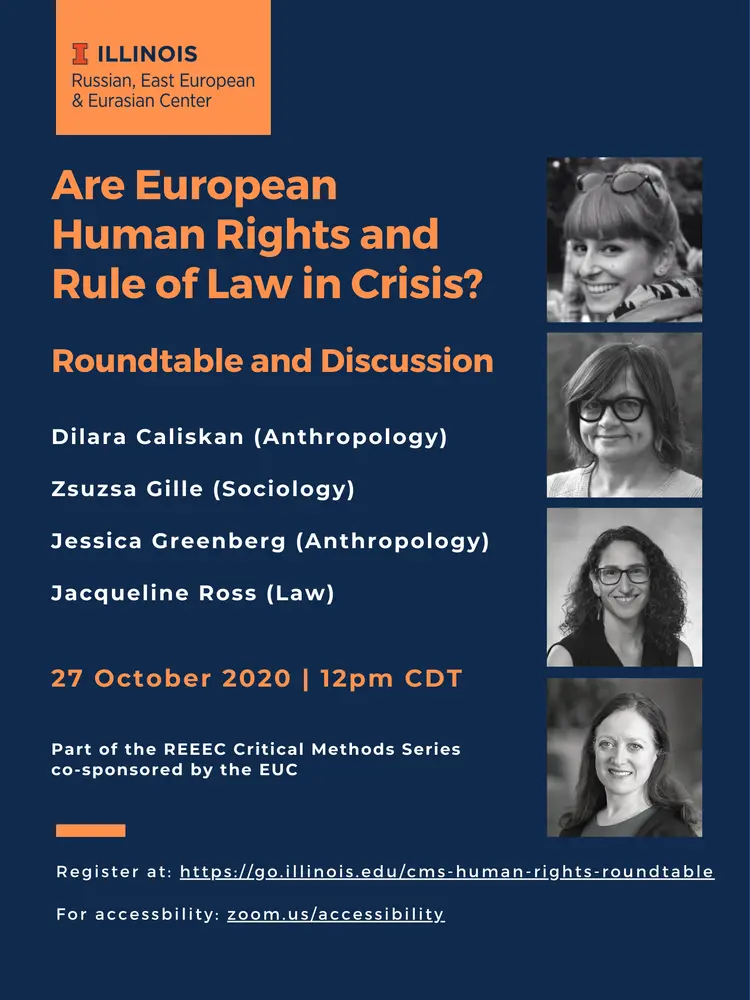
By Tabitha Cochran (MA Student, REEES and LIS)
On October 27th, REEEC hosted a virtual roundtable, co-sponsored by the European Union Center, entitled “Are European Human Rights and Rule of Law in Crisis?” This event was organized to kick off the Legal Studies facet of the REEEC Critical Methods Series (CMS) and had over 40 participants. Four panelists from the University of Illinois gave brief but fascinating presentations: Jessica Greenberg (Anthropology), Dilara Caliskan (Anthropology), Zsuzsa Gille (Sociology), and Jacqueline Ross (Law).
Jessica Greenberg, the organizer of the event and of the REEEC CMS in Legal Studies initiative, kicked off the roundtable by introducing her work. Integral to Greenberg’s work is the link between judicialization and advocacy, as she studies in particular the European Court of Human Rights (ECHR). She pointed out that the increase in cases in the court as well as the increased resistance to the court suggests that the ECHR has never been more important. Whether because of institutional limitations or external pushback, law seems to be in crisis. Questions of advocacy, counter-majoritarian creation of legal norms, legitimate or illegitimate use of force, “lawfare” and constitutional authoritarianism all contribute to the crisis of human rights and rule of law. With this backdrop, Greenberg introduced the foundational questions of the Roundtable:
- Is law enough? When does it facilitate or hamper social justice?
- Is there any validity to the law in crisis framework when applied to Europe? If so, what is the nature of the crisis?
- Are solutions to the abuses of law to be found within legal institutions, human rights, or constitutional rights themselves?
- Are there limits to the kind of justice and accountability we can get from legal frameworks? Can we expand the move for justice, more open democratic processes, etc. within existing legal institutions?
Dilara Caliskan’s research is focused on Turkish communities of trans women, and particularly on memory and mother-daughter relations within those communities. She discussed queer kinship relating to state and law, and the impunity that often privileges anti-trans abusers. Activists and NGOs have called attention to the unconstitutional actions of the Turkish government, particularly in persecuting LGBTI individuals. These condemnations by external associations have been largely ineffectual and the Turkish president continues to act with impunity, eroding the LGBTI community’s hope in legal structures.
Zsuzsa Gille discussed post-political governance in Hungary by highlighting three recent cases: the University of Theatre and Film Arts in Budapest, the Hungarian Evangelical Brotherhood, and Klubradio. These three organizations have undergone different attacks on academic freedom and freedom of speech within a legal framework. Rather than censoring or repressing these organizations outright, they have had permits revoked or been privatized in a way that effectively cripples their operation. Gille noted that these measures are completely legal and exemplify the shift toward “soft law” in the EU: norms that are voluntary, flexible, and, consequently, unenforceable.
Jacqueline Ross addressed the crisis of legitimacy that is facing French police, and how they respond to this crisis. She outlined five intelligence regimes that communities might adopt: public safety intelligence, criminal intelligence, order maintenance, partnership, and managerial. These five intelligence regimes function as different lenses through which communities deal with a particular issue. They have different time horizons, emphases, and workers depending on what values are prioritized. According to Ross, during a crisis of legitimacy community leaders will switch lenses depending on which lens is facing the most criticism.
The discussion after these talks focused on the question of over-investment in the law and the political economy of rule of law initiatives. Notably, the ECHR has in some ways enabled states to violate their citizens’ human rights so long as their actions are supported by the state’s laws. The exclusionary atmosphere of the law was also highlighted, raising the question of whether there are alternatives to this emphasis on rule of law. There is much more work to be done in this area, but the afternoon roundtable proved to be thought-provoking and illuminated how law’s uses and abuses are shaping democracy across the continent. The next major event in this initiative will be a February lecture by Kim Lane Scheppele, who will speak about rising authoritarianism and constitutional crisis in Eastern Europe.
Tabitha Cochran is a Master’s student in REEES and Library and Information Sciences. Her research interests are focused on national identity in late imperial and early Soviet Ukraine.